Junior Ranger program
Our Junior Ranger program is a year-long, environmental education program for 5th and 6th graders local to Centro PUMA. The heart of the program begins during January, the last month of “summer vacation” for 26 kids before returning to school from the holidays. We led half-day classes twice a week for 4 weeks, culminating in an all-day excursion around the island.
Classes included daily games and teambuilding activities.
Topics included Leave no Trace, plants, animals, water, ecosystems, and geology/volcanoes.
Field trips are not part of school curriculum, and locals rarely are able to visit and enjoy the tourist attraction that their local island offers, so we try to change that with our excursion. So we rented a school bus for the day
and took them to Finca Magdalena to visit the historic coffee farm and take a hike to the petroglyphs.
Next, we went to Playa Peru and took each kid individually on a kayak paddle along the bay. It was each kid’s first time, so we paired each of them with an experienced adult, but we let the kids do the paddling, of course!
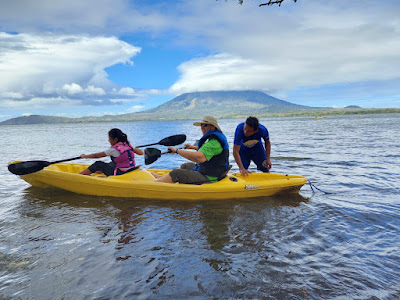
We visited Peñas Incultas, one of the best-preserved tropical dry hardwood forests in Nicaragua.
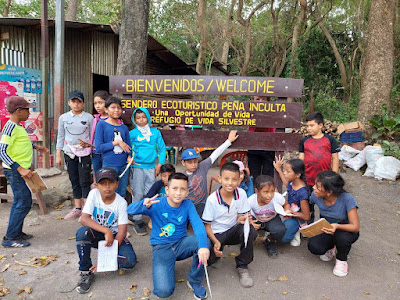
Peñas incultas is one of the best nesting areas for the yellow-naped amazon parrot, a critically endangered species that has one of its last strongholds on Ometepe Island. Sure enough, we saw the endangered parrots and even found a beautiful feather.
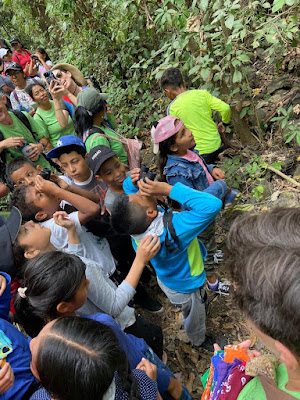
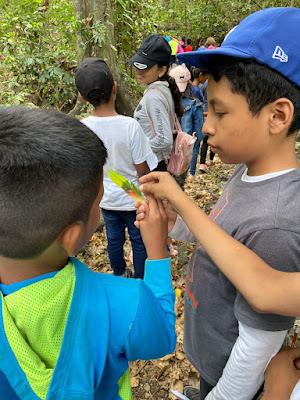
Finally, we ended the day on the beach where the kids got to play in the water (with 3 adult lifeguards around the kids at all times)
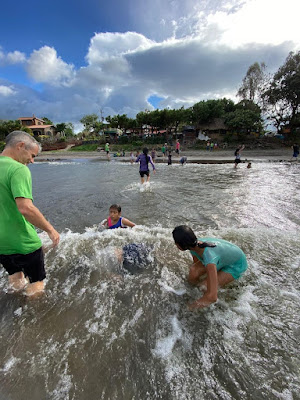
and play games on the beach until they were exhausted and brought home.
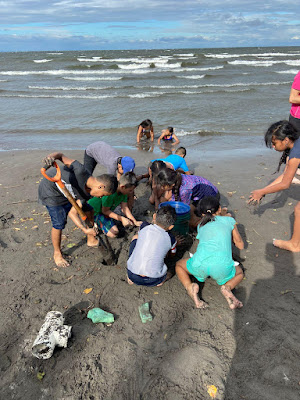
We are continuing the Junior Ranger activites on a monthly basis until they complete a final project and graduate at the end of the year. Graduated students will continue to be invited to events and to work with the project as they grow up, cultivating a new generation of stewards of the environment.
English Classes
Every year we put out a call to the community for free saturday English classes. Initially, it was hard to generate interest, but as our popularity has grown each year, things really started to grow, especially by last year, when we got over 60 students. Well, we weren’t quite ready for the explosion to continue at the same rate, so when over 130 kids signed up, we had a problem as the enrollment petitions didn’t stop. As we put the latecomers on a waitlist, we still had to figure out how to more than double our capacity from last year.
There were a few days of chaos, trying to organize the kids into classes at staggered times. Occasionally, we've had to squeeze kids into our library, which was not originally designed for classes:
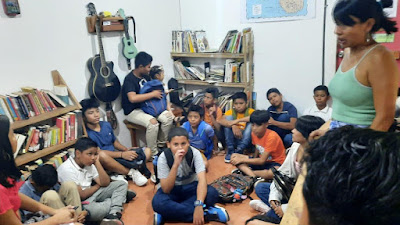
But we eventually broke the kids into groups of fewer than 20 kids into 3 periods of the day, for a total of 7 classes. This is followed by a 4th “period” of our English Café activity open to youth and adults to practice English over a complimentary cup of coffee.
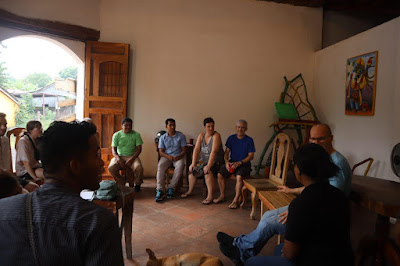
Even with staggering the classes throughout the day, it was still necessary to have up to 3 classes running simultaneously. This had to be achieved while keeping Centro PUMA’s café open. Centro PUMA has one dedicated classroom and an auditorium that can be used as café seating or closed off as a classroom. The café has a reception/dining room, library, and an outdoor shelter for clients. In the past, we held English classes in the café areas and library, but with its increasing popularity this year, we can no longer share the cafe space. So we fast-tracked a long-term project we’ve been planning, to build an additional shelter outside with a palm-thatched roof as an additional classroom area, the “Rancho.” The extra classes and the Rancho were not originally budgeted this year, but with a lot of local help and with a healthy donation campaign at the end of 2023, we were able to finish the Rancho just in time for the school year beginning in February, and we hope to continue campaigning for sufficient funds to keep our classes going. Here's our new rancho and a volunteer helping Arlin teach english classes:
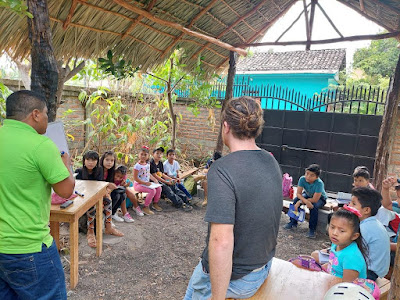
In addition to sustaining our English classes throughout the year, we are offering English classes and tutoring during the week to the kids waitlisted after the original enrollment of 130. In all, our small center is serving up to 150 kids with English lessons. It has been encouraging to see many tourists and foreigners inquire about helping, who show up at classes to read or talk to kids. Weekly classes are not enough to fully learn a language, but we hope to inspire kids by scheduling fun activities and exposing their ears to different accents and native speakers along with our local experts who use English with tourists.
Reforestation
We have been planting thousands of trees every year, but it has sadly become evident that just planting trees is not enough. With no actively protected areas on the island, most trees succumb to agricultural needs or are cut down for firewood. Our monitoring of our previous reforestation efforts has shown that fewer than 10% of the trees live for more than 3 years. This year, the guide cooperative of Centro PUMA is armed with a new grant from Global Greengrants Foundation to investigate new reforestation strategies. We will compare our previous strategy of planting on private and public lands upon invitation, but we will augment with 2 experimental strategies: paying landowners a yearly stipend depending on the survival of their trees, and renting land where we will plant and protect trees at our own expense. The ultimate goal of this project is not just to have better survival rates, but to identify the true cost of reforestation so that we and future projects can make more realistic budgets for true reforestation efforts.
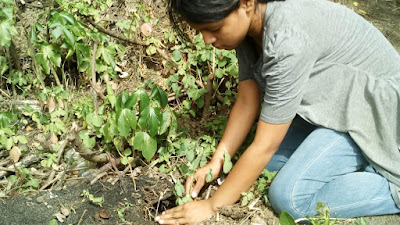
There is a quote of unknown origin (sometimes attributed without proof to Martin Luther) that says, “Even if I knew that tomorrow the world would go to pieces, I would still plant my apple tree.” This is a good philosophy for our project. It’s hard to tell which of our trees will survive, which of our lessons will be remembered, which of our kids will be inspired. Though we hope to maximize our impact with proven methods, we take our projects day by day, creating small experiences for all our people involved no matter what tomorrow may bring.
and play games on the beach until they were exhausted and brought home.
We are continuing the Junior Ranger activites on a monthly basis until they complete a final project and graduate at the end of the year. Graduated students will continue to be invited to events and to work with the project as they grow up, cultivating a new generation of stewards of the environment.
English Classes
Every year we put out a call to the community for free saturday English classes. Initially, it was hard to generate interest, but as our popularity has grown each year, things really started to grow, especially by last year, when we got over 60 students. Well, we weren’t quite ready for the explosion to continue at the same rate, so when over 130 kids signed up, we had a problem as the enrollment petitions didn’t stop. As we put the latecomers on a waitlist, we still had to figure out how to more than double our capacity from last year.
There were a few days of chaos, trying to organize the kids into classes at staggered times. Occasionally, we've had to squeeze kids into our library, which was not originally designed for classes:
But we eventually broke the kids into groups of fewer than 20 kids into 3 periods of the day, for a total of 7 classes. This is followed by a 4th “period” of our English Café activity open to youth and adults to practice English over a complimentary cup of coffee.
Even with staggering the classes throughout the day, it was still necessary to have up to 3 classes running simultaneously. This had to be achieved while keeping Centro PUMA’s café open. Centro PUMA has one dedicated classroom and an auditorium that can be used as café seating or closed off as a classroom. The café has a reception/dining room, library, and an outdoor shelter for clients. In the past, we held English classes in the café areas and library, but with its increasing popularity this year, we can no longer share the cafe space. So we fast-tracked a long-term project we’ve been planning, to build an additional shelter outside with a palm-thatched roof as an additional classroom area, the “Rancho.” The extra classes and the Rancho were not originally budgeted this year, but with a lot of local help and with a healthy donation campaign at the end of 2023, we were able to finish the Rancho just in time for the school year beginning in February, and we hope to continue campaigning for sufficient funds to keep our classes going. Here's our new rancho and a volunteer helping Arlin teach english classes:
In addition to sustaining our English classes throughout the year, we are offering English classes and tutoring during the week to the kids waitlisted after the original enrollment of 130. In all, our small center is serving up to 150 kids with English lessons. It has been encouraging to see many tourists and foreigners inquire about helping, who show up at classes to read or talk to kids. Weekly classes are not enough to fully learn a language, but we hope to inspire kids by scheduling fun activities and exposing their ears to different accents and native speakers along with our local experts who use English with tourists.
Reforestation
We have been planting thousands of trees every year, but it has sadly become evident that just planting trees is not enough. With no actively protected areas on the island, most trees succumb to agricultural needs or are cut down for firewood. Our monitoring of our previous reforestation efforts has shown that fewer than 10% of the trees live for more than 3 years. This year, the guide cooperative of Centro PUMA is armed with a new grant from Global Greengrants Foundation to investigate new reforestation strategies. We will compare our previous strategy of planting on private and public lands upon invitation, but we will augment with 2 experimental strategies: paying landowners a yearly stipend depending on the survival of their trees, and renting land where we will plant and protect trees at our own expense. The ultimate goal of this project is not just to have better survival rates, but to identify the true cost of reforestation so that we and future projects can make more realistic budgets for true reforestation efforts.
There is a quote of unknown origin (sometimes attributed without proof to Martin Luther) that says, “Even if I knew that tomorrow the world would go to pieces, I would still plant my apple tree.” This is a good philosophy for our project. It’s hard to tell which of our trees will survive, which of our lessons will be remembered, which of our kids will be inspired. Though we hope to maximize our impact with proven methods, we take our projects day by day, creating small experiences for all our people involved no matter what tomorrow may bring.

